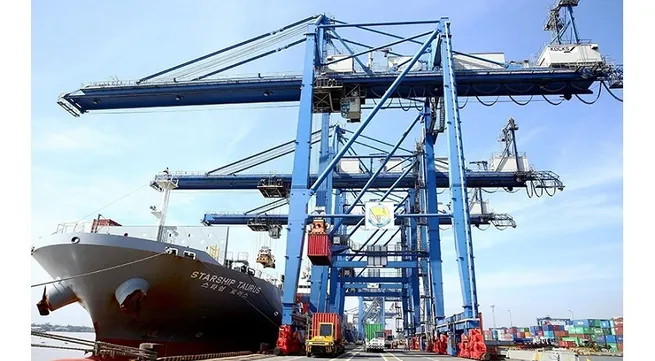Vietnam determined to fulfil socio-economic development goals in 2021

Despite facing unprecedented difficulties and challenges due to the COVID-19 pandemic, along with the negative impacts of climate change, last year Vietnam still maintained positive economic growth in the context of a severe global economic recession and overall negative global growth of 4%. Moreover, the country still realised quite comprehensively the goals set out not only for 2020 but also for the 2016-2020 period with many new outstanding efforts.
Bright spot in global growth
Vietnam's great success in a turbulent year was fulfilling a "dual goal" of both effectively controlling the epidemic and maintaining economic growth. Minister of Planning and Investment Nguyen Chi Dung said that 2020 is to be considered a year of great difficulties and challenges for all countries, including Vietnam, due to COVID-19. However, with drastic and effective solutions in realising the above-mentioned dual goal, Vietnam still achieved positive results while maintaining positive economic growth.
2020 was also the last year in the national socio-economic development plan for 2016-2020, a period in which Vietnam overcame many challenges to achieve important and comprehensive progress across most fields. These can be mentioned as the whole country focused on coping well with COVID-19, thereby creating favourable conditions for socio-economic recovery and development. The macro economy was stable, inflation was controlled at a low level, and the quality of growth was improved. More investment was poured into socio-economic infrastructure system development, with many important works and projects completed last year. Economic restructuring associated with growth model innovation was accelerated and achieved significant results, along with administrative reform and the improvement of the business environment. Foreign affairs and international integration activities were actively promoted and achieved important results.
Data from the General Statistics Office showed that GDP in 2020 increased by 2.91%, although this was the lowest rate in the recent decade but still a great success in the context of the complicated COVID-19 epidemic, placing Vietnam in the group of countries with the highest economic growth in the world.
Notably, the quality of economic growth had a positive change as labour productivity is estimated at VND117.9 million per employee (equivalent to US$5,081/employee, up US$290 compared to 2019). The Incremental Capital-Output Ratio (ICOR) also continues to be improved. The added value of the whole industrial sector increased by 3.36% over the previous year, of which, manufacturing increased by 5.82%, playing a key role in leading the overall growth of industry and the economy in general. Public investment disbursement reached 91.1% of the yearly plan with the highest capital growth rate in the past 10 years.
In the context of global trade and investment breaking down due to the impact of the epidemic, the attraction of foreign investment into Vietnam decreased less than the global decline, while total export turnover still increased by 5.1% and a trade surplus was maintained at a record figure of US$19.1 billion, the highest in five years.
With these impressive growth results, Vietnam has become a bright spot in global economic growth. This has been recognised through the simultaneous adjustment to raise the forecast of Vietnam's economic growth in 2020 by prestigious international financial institutions. For example, the World Bank (WB), in its review report published at the end of December last year, raised its forecast for Vietnam's economic growth to nearly 2.8%, while the International Monetary Fund (IMF) adjusted its growth forecast to 2.4% instead of the 1.6% put forward in the third quarter, and the Asian Development Bank also raised its forecast for Vietnamese economic growth from 1.8% to 2.3%.
According to the IMF, the scale of Vietnam's economy has now reached more than US$340 billion, among the top 40 economies in the world, equal to or surpassing some highly developed economies in the region. British magazine The Economist ranked the country in the top 16 most successful emerging economies in the world. According to WB data, with an average economic growth rate of 6.8% a year during the 2016-2019 period, Vietnam is among the top 10 highest growing countries in the world.
The Government's report on economic development in 2020 and the 2016-2020 period emphasised that one of the highlights of Vietnam's current economic growth is that it has been much more inclusive, not just in urban but also rural areas, not only in the deltas but also in mountainous and border areas and on islands. Economic growth no longer depends overly on any one economic sector. In addition to the state-owned enterprise sector and foreign-invested enterprises, the role of the private economic sector is gradually being confirmed as an important driving force for the country’s development as stated in Resolution No. 10 NQ/TW of the 12th Party Central Committee. Vietnam's economic growth also does not focus on only a few economic sectors, as the structure of industry, services, and especially agriculture all play the same role and make important contributions to the whole picture.
Boosting economic recovery, regaining growth momentum
Resolution No. 124/2020/QH14, issued by the National Assembly on the socio-economic development plan in 2021, states that the international and domestic situation is forecast to see a mixture of both opportunities and difficulties, of which, the COVID-19 pandemic continues to be the main negative factor across many fields. In that context, it is necessary to focus on effectively implementing the dual goals of both preventing and combating the epidemic and protecting the people's health, while boosting socio-economic recovery and development on the basis of maintaining macroeconomic stability, controlling inflation and ensuring an economic balance. Other tasks include strongly promoting economic restructuring associated with growth model innovation, improving productivity, autonomy and competitiveness, and strongly developing the domestic market, in addition to accelerating the implementation of important national projects, promoting the role of key economic regions and big cities, and strengthening the digital transformation.
In 2021, Vietnam's economic growth is expected to rebound strongly on the solid foundation of macroeconomic stability and maintain positive growth, despite the unprecedented damage caused by the COVID-19 pandemic. There are multiple challenges in the current situation, but the Government is determined to increase GDP growth to 6.5%, 0.5 percentage points above the target assigned by the National Assembly.
Dr. Nguyen Dinh Cung, a member of the Economic Advisory Group of the Prime Minister, said there is still room for growth in 2021. With the right solutions, Vietnam's economy may achieve more positive growth. The key task for 2021 is to speed up economic recovery even more with a focus on encouraging the development of new businesses and careers in addition to continuing support policies to save troubled businesses from bankruptcy due to the impact of COVID-19.
According to Dr. Cung, improving the business environment was also a highlight during the 2016-2020 period with the inheritance of Resolution No. 19 but being much broadened and focusing more on removing barriers for business freedom across all areas. However, the business environment reform in 2020 faltered because it was no longer urgent task as the Government focused on pandemic control. In 2021, the task of reforming the business environment should be promoted to create conditions for the business community to recover and develop, thereby promoting economic growth.
Associate Professor, Dr. Tran Dinh Thien, Chairman of the Economic Advisory Council to the Vietnam Fatherland Front Central Committee, said that Vietnam's economic growth at 2.91% in the past year should be considered a miracle, because while all major economies recorded negative growth, the Vietnamese economy, with its very high level of openness, should have been more affected by external shocks as the world's supply chains broke down, but it overcame the challenge successfully.
Maintaining macroeconomic stability and positive growth is an important foundation for Vietnam's economy to recover strongly from the pandemic, Dr. Thien said, suggesting that in this crisis, Vietnam needs to make use of the opportunity to take a step forward in its development, by adhering to growth model innovation, innovative startup promotion policies, and synchronous digital transformation in both the business community and State management.





